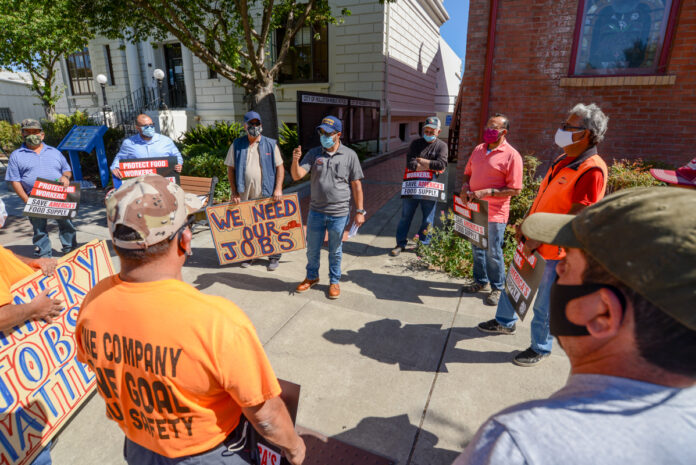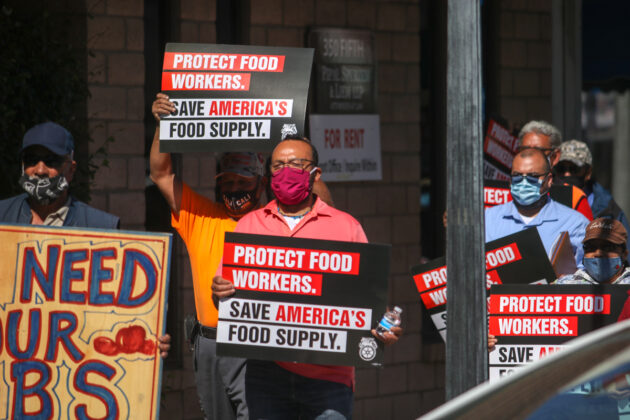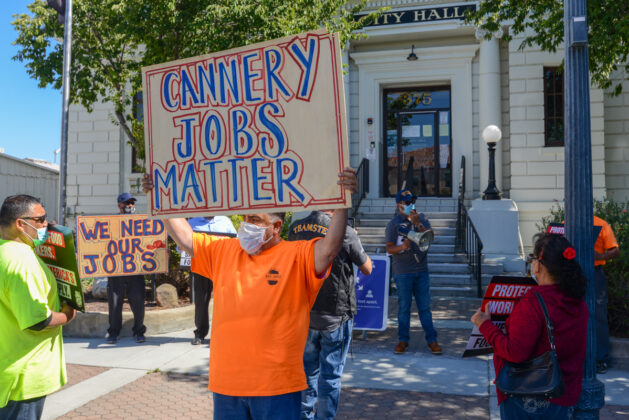
The 2020 season is right around the corner for San Benito Foods as workers gear up to can hundreds of pounds of tomatoes. However, the company is facing a water issue that could prevent the cannery from opening its doors and leaving hundreds without jobs.
A group of employees and representatives from Teamsters Local Union No. 890 on July 14 protested in front of Hollister City Hall to call out Mayor Ignacio Velazquez to ensure that the city continues to provide that service.
Jorge Valenzuela, representative for Teamsters Local Union No. 890, said the city is demanding San Benito Foods pay $4.5 million in order to continue providing water to San Benito Foods.
“They want to stay in Hollister but the city is putting them in a position where they might not be able to stay,” he said.
Velazquez said the discussion about water fees—which is also related to water quality issues at the site—has been happening for years and San Benito Foods has been aware of the problem.
“This is no sucker punch at the last second, not at all,” he said. “This is something that’s been discussed time and time again.”
San Benito Foods at 110 Hawkins Street currently employs nearly 600 people who are in jeopardy of losing their jobs during a pandemic that has already proven to be catastrophic to working families.
Mary Cortes Solorio, a 25-year veteran of the company, said she sees this as a threat to shut down the cannery for good. She said it doesn’t make sense because it won’t benefit the city.
“It’s one of the few jobs in Hollister because there aren’t many out there,” she said. “We have three to four generations of people working here.”
According to a press release issued by Valenzuela, San Benito Foods operations and capital investments generate $167,000 per year in property taxes to support local public agencies. He said the city could lose more than $10.3 million over the next 10 years if Velasquez and the city council refuse to provide water.
Cortes Solorio said she just wants the city to understand that they need their job and they’re not asking for any government assistance.
“We just want to work,” she said.
Valenzuela said the city usually asks San Benito Foods to pay $27,000 per year to keep the water running. But this year they’re demanding more than 150 times that amount, which he said is puzzling to him.
Valenzuela said the California State Water Resource Control Board fined the City of Hollister. He said both parties reached an agreement in 2019 that would clear up the hard solids and sludge from the Hollister Reservoir.
“Now the city is saying ‘Here you go San Benito Foods, hot potato, you pay for it,’” he said.
Valenzuela said that San Benito Foods wasn’t part of the negotiations and is questioning why they still have to pay a hefty fee. He said they’ve been trying to contact the city attorney and Velazquez to come to a resolution.
Valenzuela said the workers also took a stand by demanding public transparency in the city’s dealings with San Benito Foods.
“The other part of it too is that none of the residents in San Benito County seem to know about it because all of these deals were done behind closed doors,” he said.
Velazquez said there are two issues at the moment: water quality and the removal of sludge in the ponds used by San Benito Foods.
Velazquez said he visited the cannery and noticed the problem of sludge being sucked into the blowers that gets sprayed out, which causes a terrible smell. He said the reality is that there’s a cost for cleaning up the waste.
“Every year we have this stink,” he said. “It’s like a bunch of rotten eggs and it will go on for several weeks.”
Velazquez mentioned there’s a high salt content in the water San Benito Foods uses from a nearby well. He said the state water board told the city the problem needs to be fixed or else they’d face fines up to $100,000.
The city owns a license for a water discharge permit, which means they deal with the consequences. Velazquez said he asked San Benito Foods to put the license under its name but the company has refused.
“Please do the right thing. You are contaminating our water table,” Velazquez said. “It’s very clear what the state wants from you and there’s no getting out of this anymore.”
Velazquez said he wants San Benito Foods to commit to removing the sludge. He said they’re not asking to fix the problem overnight—just an assurance that the job will be done.
“This is not the responsibility of the taxpayers of the City of Hollister to pay for this work for you,” he said. “This is your mess, this is what you need to clean up.”
Last year, the roof of the tomato processing warehouse collapsed. The building was old and there were a variety of factors that could have led to the collapse such as age, weight, weather and seismic conditions.
San Benito Foods is the last remaining cannery in the county. The cannery, which skins, chops and cans roughly 12.5 million tons of tomatoes annually, is owned by Vancouver, Wash.-based Neil Jones Food Company.













